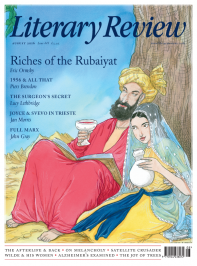Gillian Slovo
The Politics of Forgiveness
We Are Not Such Things: A Murder in a South African Township and the Search for Truth and Reconciliation
By Justine van der Leun
Fourth Estate 528pp £14.99
On 25 August 1993, Amy Biehl, a 26-year-old African-studies major from California, agreed to give three friends a lift into the Cape Town township of Gugulethu. Amy was in South Africa researching the role of women in the coming transition to democracy. Now, with her studies complete, she was about to go back to America. She knew how bloody the years since Mandela’s release had been, but she’d also previously travelled in and out of Gugulethu without incident. This time, however, she ended up driving towards a demonstration organised by the Pan Africanist Congress (PAC). The PAC is an African nationalist movement that split from the ANC in the 1950s and whose supporters used the slogan ‘one settler, one bullet’, with anybody white being counted a settler. At the sight of Amy, members of the crowd attacked. A brick thrown through the windscreen hit her and when, disoriented and terrified, she stumbled from the car, she was chased, brought down and stabbed. ‘What did I do?’ she is quoted as saying (though we are never told who heard this), followed by ‘I’m sorry’, her last words before dying.
Four people were found guilty of Amy’s murder and sentenced to eighteen years’ imprisonment each. But they didn’t have to spend long in jail. Having applied for amnesty from the Truth and Reconciliation Commission (TRC), they successfully argued that theirs had been a political act. As a result their sentences

Sign Up to our newsletter
Receive free articles, highlights from the archive, news, details of prizes, and much more.@Lit_Review
Follow Literary Review on Twitter
Twitter Feed
Under its longest-serving editor, Graydon Carter, Vanity Fair was that rare thing – a New York society magazine that published serious journalism.
@PeterPeteryork looks at what Carter got right.
Peter York - Deluxe Editions
Peter York: Deluxe Editions - When the Going Was Good: An Editor’s Adventures During the Last Golden Age of Magazines by Graydon Carter
literaryreview.co.uk
Henry James returned to America in 1904 with three objectives: to see his brother William, to deliver a series of lectures on Balzac, and to gather material for a pair of books about modern America.
Peter Rose follows James out west.
Peter Rose - The Restless Analyst
Peter Rose: The Restless Analyst - Henry James Comes Home: Rediscovering America in the Gilded Age by Peter Brooks...
literaryreview.co.uk
Vladimir Putin served his apprenticeship in the KGB toward the end of the Cold War, a period during which Western societies were infiltrated by so-called 'illegals'.
Piers Brendon examines how the culture of Soviet spycraft shaped his thinking.
Piers Brendon - Tinker, Tailor, Sleeper, Troll
Piers Brendon: Tinker, Tailor, Sleeper, Troll - The Illegals: Russia’s Most Audacious Spies and the Plot to Infiltrate the West by Shaun Walker
literaryreview.co.uk